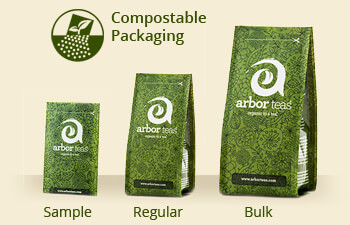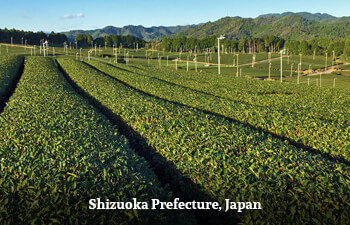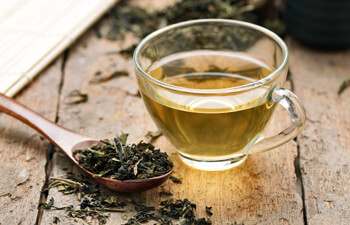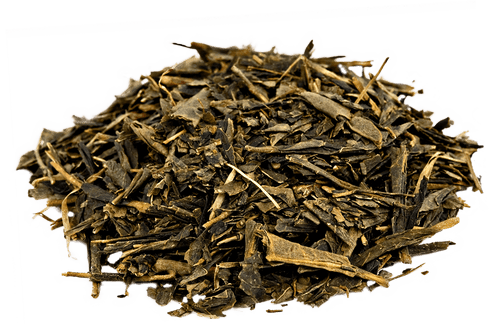Organic Hojicha Green Tea

This organic Japanese green tea is roasted to perfection to produce an amber infusion with flavors of toasted grain and stone fruit, with a pleasant buckwheat aftertaste. Our most recent lot boasts a more pronounced toasted flavor profile. Although this is truly an organic green tea (in that it lacks oxidation), the leaves are turned brown during the roasting process. According to Japanese research, Hojicha Green Tea (also spelled "Houjicha") is reputed to have lower caffeine than other green teas because of the unique roasting technique. This organic loose tea can be brewed with hotter water than most green teas and is devoid of astringency.
Ingredients: organic Japanese green tea
Origin: Shizuoka Prefecture, Japan

Located in central Japan, Shizuoka is known as the capital of Japanese green tea production. Though it is not the oldest producer of green tea, it is the largest: this prefecture alone accounts for 40 percent of all green tea production in Japan. However, much of the world never experiences organic tea from Shizuoka because tea is so popular in Japan that most tea grown in Japan is consumed in Japan; very little is exported. Shizuoka lines the Pacific, and runs into the Japan Alps and other mountains, including Mt. Fuji. For those concerned with the implications of the Fukushima-Daiichi disaster, we continue to have our organic teas from Japan independently tested for radiation.
Steeping Instructions

At Arbor Teas, we believe tea should be brewed to suit your personal taste. We’re happy to make recommendations to get you started, but don’t hesitate to experiment! When brewing your tea, your main considerations are tea quantity, water temperature, and steeping time. We recommend green and white teas to be steeped for 2 to 3 minutes in water heated to not-quite-boiling, just as bubbles begin to form on the bottom of the pan (approximately 170 to 180 degrees F). For the best flavor, use fresh water whenever possible. Try not to steep your tea longer than necessary, as you’ll extract undesirable bitterness from the leaves. If you want a stronger brew, don’t steep longer, just use more tea. And don’t forget to re-steep your tea leaves to get the most out of your leaf!
Looking for more info? Check out our How-To Guides and Eco-Brewing Tips!
Staff Perspectives
 Taylor
Taylor
”Mild flavor, green tea taste. Notes of rice, vegetable, grass, oats, and watermelon rind."
 L’Oreal
L’Oreal
”One of my favorites! I love the nuttiness that comes from the roasting of the tea leaves. Very comforting!"
 Aubrey
Aubrey
"Because of the mellow, non-astringent qualities of this tea, I like to drink Hojicha at night. I also recently found that it makes an EXCELLENT iced tea!"
Health Benefits

Like all true tea, green tea offers many potential health benefits. Research has found that tea (Camellia sinensis) can have many positive effects on human health, including improved cardiovascular function, cancer risk reduction, improved immune function, improved oral health, and help with weight management. Tea is also full of polyphenols, which are a class of antioxidant that help your body maintain homeostasis and balance your stress levels.
Green tea specifically is known for its array of health benefits, which have been supported by a growing number of studies. Green tea research has demonstrated that it may be an effective anticancer agent for breast cancer, lung cancer, kidney cancer and prostate cancer, among others. Studies have shown a link between green tea and weight loss, and the ability to modulate energy metabolism, aid in body fat regulation, and possibly promote preferential loss in abdominal fat. Research has also shown that green tea may increase performance for short term memory tasks, as well as being increasing potency of antibiotics. Other peer-reviewed studies link green tea to healthy skin, help with lowering cholesterol, and regulating diabetes. It’s important to keep in mind that many of these studies monitor subjects who drink several cups of green tea per day.
For more information about the health benefits of green tea, and for direct sources of the above information, check out our Tea Health Benefits page!
Please note: the information above is for educational purposes only and has not been evaluated by the Food and Drug Administration. This information is not intended to diagnose, treat, cure, or prevent any disease.









